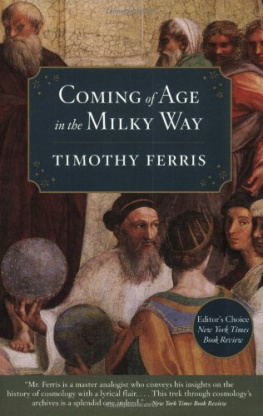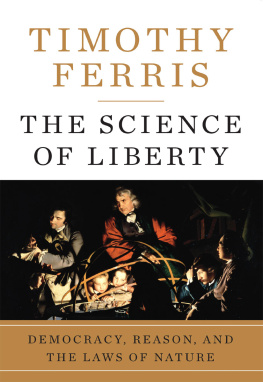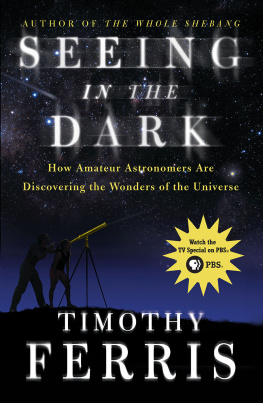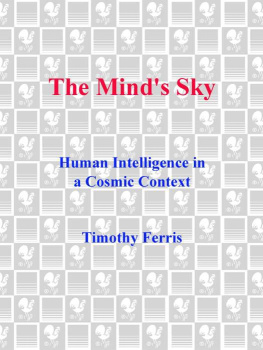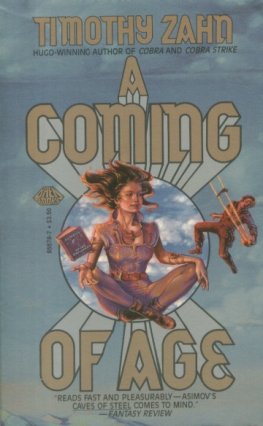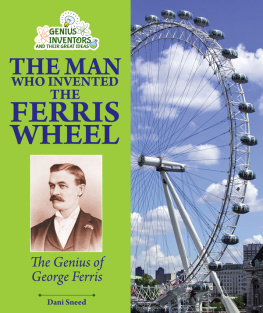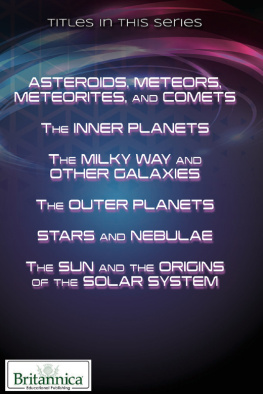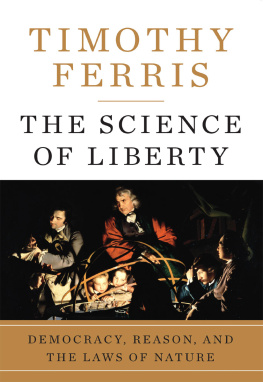Timothy Ferris - Coming of Age in the Milky Way
Here you can read online Timothy Ferris - Coming of Age in the Milky Way full text of the book (entire story) in english for free. Download pdf and epub, get meaning, cover and reviews about this ebook. year: 2003, publisher: Harper Perennial, genre: Religion. Description of the work, (preface) as well as reviews are available. Best literature library LitArk.com created for fans of good reading and offers a wide selection of genres:
Romance novel
Science fiction
Adventure
Detective
Science
History
Home and family
Prose
Art
Politics
Computer
Non-fiction
Religion
Business
Children
Humor
Choose a favorite category and find really read worthwhile books. Enjoy immersion in the world of imagination, feel the emotions of the characters or learn something new for yourself, make an fascinating discovery.
- Book:Coming of Age in the Milky Way
- Author:
- Publisher:Harper Perennial
- Genre:
- Year:2003
- Rating:3 / 5
- Favourites:Add to favourites
- Your mark:
- 60
- 1
- 2
- 3
- 4
- 5
Coming of Age in the Milky Way: summary, description and annotation
We offer to read an annotation, description, summary or preface (depends on what the author of the book "Coming of Age in the Milky Way" wrote himself). If you haven't found the necessary information about the book — write in the comments, we will try to find it.
Coming of Age in the Milky Way — read online for free the complete book (whole text) full work
Below is the text of the book, divided by pages. System saving the place of the last page read, allows you to conveniently read the book "Coming of Age in the Milky Way" online for free, without having to search again every time where you left off. Put a bookmark, and you can go to the page where you finished reading at any time.
Font size:
Interval:
Bookmark:
C OMING
OF A GE
IN THE
M ILKY
W AY
T IMOTHY F ERRIS

For Carolyn
If I could write the beauty of your eyes
And in fresh numbers number all your graces,
The age to come would say, This poet lies
Such heavenly touches neer touched earthly faces.
S HAKESPEARE
P ERENNIAL E DITION
I f, as is often suggested, writing a book is like giving birth, publishing a book is like watching ones child graduate from college. The author hopes that the book will have a healthy life of its own, going off into the world and requiring little more in the way of parental help or guidance. The longer the book fares well, the less the author matters: Such is the apt, implicit bargain struck by parents with their children, and authors with their books.
This author has had occasion to feel proud of this child. During the fifteen years since its publication, Coming of Age in the Milky Way has made its way on sturdy legs. Critics have been kind to it, professors have taught it, and readers around the world have proved gratifyingly loyal to it.
So why, now, is the author injecting himself back into its affairs, like a father preposterously hogging the spotlight at his daughters wedding?
Principally because fifteen years is a long time in astronomy and cosmology, during which new and exciting things have happened. Some readersthe professors especiallyhave asked if a new edition might not be prepared, to update the unfolding story of humanitys investigations into the nature of space and time. So here it is.
Few revisions have been required to the original book, except to correct a handful of typographical errors and authorial infelicities. Fevered newspaper headlines to the contrary, established sciences nowadays seldom undergo revolutions that oblige researchers to rethink their basic notions about the cosmos. There have, however, been several genuine surprises, some of which have profound potential consequences. Cosmology appears to be entering a new era, characterized both by a greatly improved ability to probe the history and evolution of the universe and by startling discoveries that open up exciting new vistas on the cosmos. This news of the universe is reported in the Addendum to this new edition, beginning on page 389.
The best news is that human knowledge of time and space continues to expand, shining like a brightening beacon in a world still benighted by ignorance and by the fear, rage, and greed that ignorance fosters. When tempted to curse the darkness we do well to remember that the circle of light is growing. Tending to it are many heroes, ranging from celebrated scientists to unsung teachers whose students may, in time, light a few lamps of their own. Without them, books like this one could not be written.
AND
A CKNOWLEDGMENTS
How oft we sigh
When histories charm to think that histories lie!
Thomas Moore
T his book purports to tell the story of how, through the workings of science, our species has arrived at its current estimation of the dimensions of cosmic space and time. The subject is grand, and it goes without saying that the book is unequal to it. Of the limitations and liabilities of this work I would hope to defend only those resulting from its brevity. Obedient to the dictum of Callimachus that a big book is equal to a big evil, I have striven for economy, but economy has its price.
First, it has of course meant leaving out many things. In a general survey of science it would be ludicrous, for instance, to discuss quantum mechanics without making reference to Erwin Schrdinger, who was one of the principal architects of that innovative and fruitful discipline. My justification is that this is not a general survey. It is a book with one tale to tellthat of the awakening of the human species to the spatiotemporal dimensions of the universeand owes its loyalties to that theme alone.
In addition to encouraging sins of omission, compression tends to foreshorten history, making it seem more coherent and purposeful than it really is, or was. The real history of science is a maze, in which most paths lead to dead ends and all are littered with the broken crockery of error and misconception. Yet in this book all that is underrepresented, while disproportionate emphasis is devoted to the ideas and observations that have in retrospect proved most salient. A book that assigned a full measure of devotion to the mistakes of science would, however, be almost unreadable: Plowing through it would be like reading a collection of mystery stories of which only one or two came to any satisfactory resolution, while in most the detective switched careers before the identity of the culprit could be ascertained or the butler was irrelevantly run over by a bus.
Similarly, in recounting the long-term development of enduring conceptions one tends to assign missions to people that they did not have, or did not know that they had, at the time. Thus Maxwell becomes the father of unified theory, Fraunhofer a founder of astrophysics, and Einstein the theorist who anticipated the expansion of the universe, though there is no evidence that any of these men ever got up in the morning with the intention of doing any such thing. As Thomas Carlyle wrote, No hammer in the Horologe of Time peals through the universe when there is a change from Era to Era. Men understand not what is among their hands. But history, as they say, is comprehended backward though it must be lived forward, and when we examine our predecessors we bring our own lamps.
Economy also implies simplification. This book is intended for general readers. It keeps mathematics and jargon to a minimumsuch technical terms as seemed unavoidable are explained in the text and the glossaryand in so doing sometimes warps the very concepts it seeks to explain. Where the distortion is excessive or ill-advised the fault is of course entirely my own, but much of it results from a change of perspective: Relativity and quantum mechanics and cosmology look different to a lay observer than to a practicing scientist, just as the experience of making an Atlantic crossing on a cruise ship is different for a passenger than for a stoker in the boiler room. On the other hand, I have tried in general not to oversimplify, preferring that a subtle idea remained subtle in the retelling rather than hammering it so flat as to make it appear trivial or self-evident.
Much the same applies when it comes to ambiguities and disagreements over the facts of our intellectual heritage and their interpretation. The history of science is full of disputations about such questions as just why Galileo was persecuted by the Roman Catholic Church or whether Einstein had the Michelson-Morley experiment in mind when he composed his special theory of relativity. Having tiptoed through more than a few of these minefields, I am full of admiration for scholars who choose to habituate them. Nevertheless, I have devoted little space to detailing the contrasting arguments they have set forth. If the resulting narrative is unambiguous it is also skewed, and can claim to be accurate only insofar as I may have succeeded in supporting or inventing a point of view that may itself prove to be accurate. Here endeth the confession, with the plea that economy is a jealous god.
A word about numerical style. Exponential numbers are employed, in which the exponents express powers of ten; thus 10skies of our ancestors hung equals a one followed by three zeros, or 1,000, and 10 equals 0.001. By the word billion is meant the American billion, equal to 1,000,000,000 or 10.

Font size:
Interval:
Bookmark:
Similar books «Coming of Age in the Milky Way»
Look at similar books to Coming of Age in the Milky Way. We have selected literature similar in name and meaning in the hope of providing readers with more options to find new, interesting, not yet read works.
Discussion, reviews of the book Coming of Age in the Milky Way and just readers' own opinions. Leave your comments, write what you think about the work, its meaning or the main characters. Specify what exactly you liked and what you didn't like, and why you think so.

